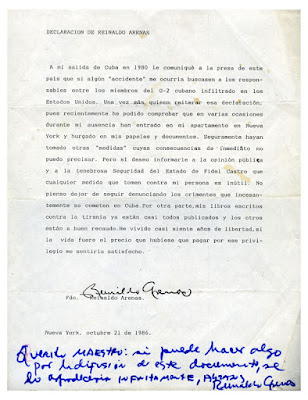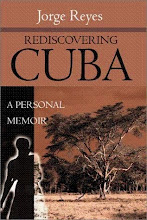Mariela Castro's triumph: free sex change surgeries in Cuba.

by Jorge Reyes
There are things in life that never cease to amaze me. Recently I was approached by the editor of a newspaper to consider the possibilities of writing an article about Cuba's latest social and legal policy: the approval of giving transsexuals in Cuba free sex operations for anyone who qualified.
In a country that boasts of having free medical services, this shouldn't have been surprising except for the fact that the type of free medical services that will be provided is nothing less than a sex change surgery and the legal change of identity.
Wow. Is this all?
As of the writing of this, there are already:
28 qualifying diagnosed transsexuals;
19 of whom want to undergo surgery;
8 do not want to undergo surgery, but they want to change their legal identity;
13 have successfully been able to change their names and replace the photo on their identity cards;
7 are waiting approval by the Justice Ministry for their legal changes.
But this is the thing, it gets even stranger still.
The move to legalize such amazing social policy has been strongly supported by none other than Mariela Castro, president Raul Castro's own daughter. Mariela, a sexologist, heads the National Center for Sex Education (CENESEX), and she's not shy about the role she played in bringing about the successful implementation of Resolution 126, as it is known, which was signed into law on June 4 of this year.
As of late, she has openly and publicly criticized Cuba's homophobia and has even apologized for her own family's role in the forceful imprisonment of gays and lesbians in the past. In the 1960's, Cuba would simply incarcerate or send to labor camps anyone suspected of being weak or effeminate. Fast-forward to 2008, and what you will get is a gay and lesbian society that doesn't seem to mince words or live in a half-world of double-truths.
 Long, it seems, are the days when Cuban writers, intellectuals or others were simply socially ostracized, arrested or deported to other countries merely for suggesting anything that went against the heterosexual machismo mores of the times. All one has to do is read Reinaldo Arenas's memoirs, novels and short-stories. I won't go into any detail about these literary gems, suffice it to say that when he died of AIDS Mr. Arenas left behind a harrowing first-person narrative of what it was like growing up gay in Castro's Cuba during the 1960's and 1970's. And it wasn't pretty.
Long, it seems, are the days when Cuban writers, intellectuals or others were simply socially ostracized, arrested or deported to other countries merely for suggesting anything that went against the heterosexual machismo mores of the times. All one has to do is read Reinaldo Arenas's memoirs, novels and short-stories. I won't go into any detail about these literary gems, suffice it to say that when he died of AIDS Mr. Arenas left behind a harrowing first-person narrative of what it was like growing up gay in Castro's Cuba during the 1960's and 1970's. And it wasn't pretty.
Even Fidel Castro gave an equally quoted interview in 1965 where he said "there are no homosexuals in the countryside." By 1992, Castro seems to have changed his mind.
But how did these changes occur without many people even discussing outside of Cuba remains a mystery. Why in Cuba, of all places, remains an even greater mystery.
What's perhaps odd, to me at least, is that before any substantial social policy takes place, a majority of the populace must have accepted such changes. In less than thirty years (and that's a brief time in a country totally micromanaged by the communist party), homosexuality went from being penalized to something that seems accepted, within limits.
I suppose that lots of credits must be given to Mariela Castro herself and the interest she's taken on behalf of a group of people largely misunderstood. She's said that for many years she tried to change her dad's own views on homosexuality and that he, far from encouraging at first, cautioned her later to be prudent and to continue with her activism.
It's difficult to predict how far these changes will go towards slowly moving away from a monolithic political system, and how much Raul Castro will tolerate. There could be a political backlash. As a friend of mine from London wrote me in a email, she hopes that these changes are not simply cosmetic in nature and used as a ruse to imprison gays and lesbians later on.
I don't think that's the case; first, the Cuban government, far from being a politically pluralistic society, didn't have to open up a space for Cuba's gay, lesbian, transsexual and trans-gendered community in order to retaliate against them later on. Yet it did and it's curious that while in the past it has lumped members of the GLBT community with political reactionaries, this time it hasn't and, in fact, separated them altogether as a potential political threat. Don't fool yourselves, it could happen even with Mariela's best intentions.

Cuba's ratification into law of Resolution 126 as well as the striving to fully integrate members of the gay, lesbian, trans-gendered and transsexual community to the forefront of public discourse and legal rights seem to be the most liberal and ambitious of its kind in the Western hemisphere, including its neighbor to the north the United States. (By the way, Mexico just this week seems to be on the forefront of progressives social policies as well legalizing gay marriages, another one of its kind simply because Mexican society is still dominated by the old prejudices and that equally hypocritical Machismo mentality.)
If Cuba's government continues on this road towards a semblance of pluralism, Raul Castro's Cuba may follow a path unlike any of us had ever expected. Others are very skeptical that this will translate into any form of political openness. They argue that this is just a little band-aid given to an oozing problem. It remains to be seen, though, if these changes however slow can also be irreversible.
Time will tell. One never knows what's going to happen in Cuba from one minute to the next.




3 comments:
I don't buy this. Fact is that Cuba is a repressive political system.
The Castro brothers can't be trusted. If they feel gays pose a political threat not even Mariela Castro can save them.
Reyes is a communist as his career has demonstrated. If he likes Cuba so much he should go back to it.
Post a Comment